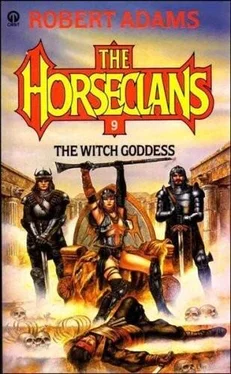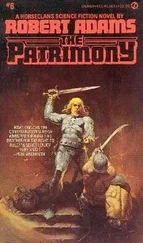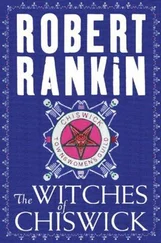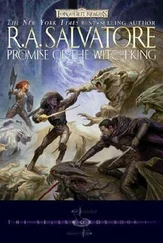Braun and the other wounded men and animals were very fortunate, for that one pony axed down by Gumpner near the rockfall was the beast on which had been packed the bulk of the expedition’s medical supplies and drugs so that far more men lived through the terrible night than might otherwise have done so. It was likewise fortunate for them all that Erica included among her degrees an M.D.
After she had set, bandaged and splinted Braun’s leg and administered those medications available, she went on to clean and cover wounds and burns and handle broken bones for first the men, then the riding and pack animals. But she refused to attempt surgery on the two unconscious troopers obviously in need of such treatment.
“Yes, Jay, I was and still am a very gifted surgeon, in my mind, that is; but good surgery is more than simple knowledge of procedures. The body must be trained as well, you see, and this one is not. I’ve not been in it long enough to even get to know it very well. And even were I in my original body—the one I was born in, I mean—under the existing conditions and with the available equipment, I very seriously doubt that I could help those two. Probably the kindest thing to be done is to have Gumpner put them down as he did that pony with its eyes burned out. But best to do it now, before they have a chance to come to and start to suffer again.”
But Corbett did not delegate the soul-wrenching task to his subordinates. He borrowed Gumpner’s axe and did the two mercy killings himself, driving the backspike of the axe accurately and deeply into each wounded man’s skull at the confluence with the spinal column.
When Gumpner inquired as to burials, Corbett could only shake his head and sigh. “We lack even a single spade, and besides, the soil’s too thin hereabouts for a real grave. No, Sergeant, strip them—clothing, too; we aren’t out of this mess yet, not by a long shot, and we may have need of all their effects before we are—then get them farther up on top the landslide and try to cover them with rocks.
“Have a detail get the gear off that pony and then butcher the carcass. Have another detail scrounge any pots or pans, then send some men out there to drag some of those charred treetrunks back here to cook the meat.
“Corporal Cash,” he said, turning to the junior noncom, he of the high-tenor voice, “take a head count—how many sound men, how many wounded, how many weapons and how much ammo for them, quantities and types of supplies or equipment left or salvageable, important items that are missing, that sort of thing. And find out how much water we have. It will have to be pooled and rationed tonight and maybe tomorrow.”
The night came down quickly, was long and unremittingly hellish, with neither moon nor stars visible, but the whole area lit by the dim and flaring glow of near and distant fires. Ash fine as dust continued to drift thickly down, occasionally interspersed with showers of glowing coals blown by the shifting winds from the blazing forests on the hillsides.
The animals on the picket line had to be constantly tended. Every protectable inch of their hides had to be covered and their nostrils and eyes hooded with wet cloths. The humans too found it necessary to shield exposed skin surfaces from the corrosive, blistering ash, and to breathe through damp fabric. In the dearth of water, Corbett ordered that the animals’ cloths, at least, be wetted down with their own and human urine.
No one got any sleep, three of the wounded died, and it seemed to all that that endless night of fire and horror would never come to an end. But, like all nights, end it did, in a wan and hesitant dawning.
“Were it feasible,” Jay Corbett informed Erica, “I’d stay here at least another day, but we and the animals all must have water, and soon, and the map shows a sizable stream only a few klicks farther along this track. Except for Dr. Braun, for whom I’m having a horse litter made and rigged between my mule and that one that strayed in, last night, Gumpner has determined that all of the wounded left alive this morning are fully capable of sitting a pony. You’ve got Braun’s mule and the rest of us will walk.”
She nodded understanding and approval, but said, “Fine, Jay, but before we do anything, we must radio Broomtown or the Center or both, let them know what’s happened and have them on standby, ready to copter up and get Harry and the few loads left as soon as we’re within range.”
He shook his head. “Impossible, Doctor. Even with booster units—which we no longer have—these saddle sets won’t range much over twenty miles.”
“But the big transceiver… ?” she began, then frowned, remembering. “Oh!”
“That’s right, Doctor. It was near the end of the train, along with all of our supplies, ammo, tents and so on, so it’s either under the rocks back there or somewhere out in those burned-over areas; useless to us, in either case, even if we took the time and were lucky enough to find it. No, Doctor, forget about help from the Center or Broomtown or anywhere else. We’re on our own, and we will be for some hundreds of kilometers more.”
Twice before they were formed up to begin the southward march, stray ponies—two of the four still bearing pack saddles—wandered in, three of them forming a small herd and the other in company with a full-sized horse.
The horse seemed a bit skittish, but Corbett, who had always had a way with equines, quickly won the big gelding over and, after petting him for a while, examined him and his equipage.
The big bay’s neck and throat were armored with steel chainmail and plates of stiffened leather; a chamfron of thicker leather edged with metal protected the beast’s face and a brisket plate of similar construction his chest. The saddle also edged and studded with metal, was a warkak, such as were made and used in the Middle Kingdoms, to the north and east. From the off side of the pommel hung a short-handled mace, its angular iron head clotted with old, dried blood and hair. From the near side hung a waxed-leather waterskin containing over a quart of brandy-water.
“Where in the world… ?” said Erica. “Jay, those primitives who crossed the track yesterday—none of them was riding anything like this horse.”
He nodded. “More than likely this is from the force they were running from, Doctor. Remember, I told you that they looked like survivors fleeing a lost battle. Although he’s armored like a destrier, this fellow is not war-trained to the extent that a destrier is, else I’d never have gotten near him without getting mauled. He’s probably a troophorse, such as most of the northern mercenary cavalrymen ride. And there clearly was a battle. Not only is that mace thick with blood, but the entire near side of the saddle and gear is crusted… and it’s not his, either; he doesn’t appear to be injured, except for a few small burns here and there.”
The march down to the targeted creek was uneventful, save for the ingathering of several more ponies and a couple more mules. However, at the creek—or, more precisely, on an island in the middle of the creek—Corbett and his party were very pleasantly surprised to find Sergeant First Class Leon Cabell and four other Broomtown men, all a trifle singed and their mounts, as well, but otherwise uninjured. With them were a few more pack beasts laden with metals from the looted hold, another riderless warhorse of the northeastern breed… and a bound prisoner mounted on a shaggy, ill-kept pony.
Cabell’s report was short and terse. He and the party he now led had left the track before even the first earth tremors, riding in pursuit of a knot of pack animals stampeded by the flood of wild beasts fleeing the plateau. They had been two ridgelines away from the track by the time of the initial shocks and farther than that when the second series of tremors, the blast of noise and the rain of hot rocks had occurred.
Читать дальше












